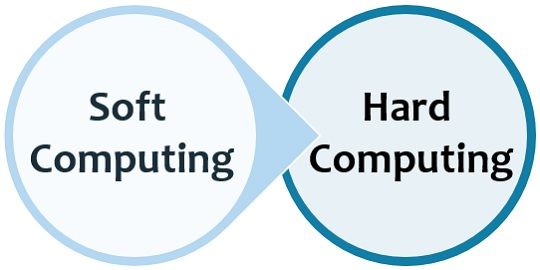Difference between Soft Computing and Hard Computing

Soft computing and hard computing are two paradigms within the field of computational intelligence, and they differ primarily in their approaches to problem-solving, decision-making, and handling uncertainty.
Here are the key differences between soft computing and hard computing:
-
Approach to Precision:
- Hard Computing: It emphasizes precision and exact solutions. Algorithms in hard computing, such as those in classical computing (e.g., algorithms based on Boolean logic), aim to provide definite and accurate results.
- Soft Computing: It embraces the concept of approximate reasoning and deals with uncertainty and imprecision. Soft computing techniques are designed to work with information that is not necessarily precise, often involving fuzzy logic, probability theory, and other probabilistic methods.
-
Handling Uncertainty:
- Hard Computing: Typically assumes that all information is exact and certain, and it operates based on deterministic principles. It may struggle when dealing with real-world problems that involve uncertainty or incomplete information.
- Soft Computing: Specifically designed to handle uncertainty and imprecision. Techniques like fuzzy logic, neural networks, and genetic algorithms used in soft computing are well-suited for problems where information is incomplete or ambiguous.
-
Nature of Algorithms:
- Hard Computing: Uses algorithms with precise rules and deterministic decision-making processes. It follows a binary logic approach, where inputs and outputs are clear and well-defined.
- Soft Computing: Involves algorithms that are inspired by human reasoning and learning processes. Fuzzy logic, neural networks, and evolutionary algorithms used in soft computing are often heuristic and adaptive, allowing for learning from data and experiences.
-
Learning and Adaptation:
- Hard Computing: Generally does not emphasize learning or adaptation. Algorithms are explicitly programmed to perform a specific task, and any changes typically require manual intervention.
- Soft Computing: Emphasizes learning and adaptation. Many soft computing techniques, especially those based on neural networks and evolutionary algorithms, can learn from data and adapt their behavior over time.
-
Applications:
- Hard Computing: Well-suited for applications where precise, deterministic solutions are required, such as mathematical calculations, database operations, and traditional algorithmic problem-solving.
- Soft Computing: Particularly useful in applications involving complex, uncertain, and dynamic environments, such as pattern recognition, image processing, control systems, and optimization problems.
-
Computational Models:
- Hard Computing: Primarily relies on classical computational models, such as Turing machines, and follows the principles of classical mathematics and logic.
- Soft Computing: Often involves computational models that are more bio-inspired, including neural networks that mimic the human brain's learning processes and evolutionary algorithms inspired by natural selection.
In summary, hard computing focuses on precise, deterministic solutions, while soft computing embraces uncertainty, approximation, and adaptability, making it well-suited for addressing real-world problems where uncertainty and imprecision are inherent.
Thank you.
